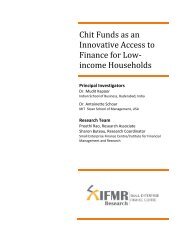Government of India Volume I: Analysis and Recommendations
Government of India Volume I: Analysis and Recommendations
Government of India Volume I: Analysis and Recommendations
Create successful ePaper yourself
Turn your PDF publications into a flip-book with our unique Google optimized e-Paper software.
TRANSITION ISSUES<br />
5. FSAT<br />
(c) Law + 2 years: By this time, the FRA will be fully functional <strong>and</strong> the new set<br />
<strong>of</strong> rules will be in place. Ombudsmen will cease to exist <strong>and</strong> all pending cases<br />
will be transferred to FRA.<br />
(a) On acceptance: Preparation for exp<strong>and</strong>ing <strong>of</strong> physical <strong>and</strong> IT infrastructure,<br />
<strong>and</strong> benches. Drafting <strong>of</strong> new procedural laws should begin.<br />
(b) On passage <strong>of</strong> draft Code: SAT will be subsumed into the FSAT. The letterhead<br />
will change. New procedural laws will be passed <strong>and</strong> come into effect.<br />
6. FSDC<br />
(a) On acceptance: The process <strong>of</strong> creating the financial system database will<br />
begin. Regulations specifying the technical specifications, as well as frequency<br />
<strong>of</strong> upgrading capabilities will be made. An interim Board <strong>and</strong> Sub-Committee<br />
will begin the process <strong>of</strong> preparing for the creation <strong>of</strong> research, analysis <strong>and</strong><br />
process for SIFI designation.<br />
(b) On passage <strong>of</strong> draft Code: FSDC will come into existence as a statutory entity;<br />
<strong>and</strong> will implement all the existing research <strong>and</strong> continue capacity building.<br />
(c) Law + 2 years: FDMC will become operational.<br />
7. PDMA<br />
(a) On acceptance: An interim Board, without any powers, should be set up using<br />
an executive order. This Board will prepare for the eventual setting up <strong>of</strong><br />
the PDMA.<br />
(b) On passage <strong>of</strong> draft Code: PDMA will come into existence as a statutory entity;<br />
will implement all functions except cash management, contingent liabilities<br />
<strong>and</strong> services to others.<br />
(c) Law + 2 years: PDMA will become fully operational.<br />
The draft <strong>India</strong>n Financial Code is expected to replace a number <strong>of</strong> existing legislations,<br />
<strong>and</strong> necessitate amendments in most other such legislations. The legislations<br />
expected to be replaced will have to be repealed. Many issues addressed by provisions<br />
<strong>of</strong> these legislations are directly addressed in the draft Code, albeit in a principles-based<br />
manner. For some other issues, subordinate legislation is expected to be issued, but the<br />
draft Code provides the general power to the regulator <strong>and</strong> the corresponding principles<br />
to guide the regulators.<br />
In this shift from a largely rules-based legal framework to a principles-based one,<br />
principles in the draft Code are expected to provide regulators with the independence<br />
to respond to problems within the financial system, using the enumerated powers given<br />
to them in the draft Code. The use <strong>of</strong> these powers is to be guided by principles in the<br />
draft Code, a requirement for benefits <strong>of</strong> a regulation to outweigh its costs, <strong>and</strong> a general<br />
requirement for consultations <strong>and</strong> research. For example, instruments such as the Statutory<br />
Liquidity Ratio (SLR) for banks <strong>and</strong> investment restrictions for insurance companies<br />
are not directly enshrined in the draft Code, but the draft Code empowers the regulators<br />
to make regulations on such requirements, guided by a set <strong>of</strong> principles, including one<br />
that requires them to be risk-based.<br />
There are also issues on which shift to a new approach is recommended, which<br />
means that certain provisions in the existing legislations or certain legislations on the<br />
whole will not find corresponding provisions in the draft Code, nor are they expected to be<br />
addressed through subordinate legislation. On these issues, the Commission has taken<br />
a considered view to recommend a move to a different approach towards regulation.<br />
For example, in the interest <strong>of</strong> competitive neutrality <strong>and</strong> regulatory clarity, the Commission<br />
recommends repealing all legislations that give special status to certain financial<br />
FINANCIAL SECTOR LEGISLATIVE REFORMS COMMISSION 139



